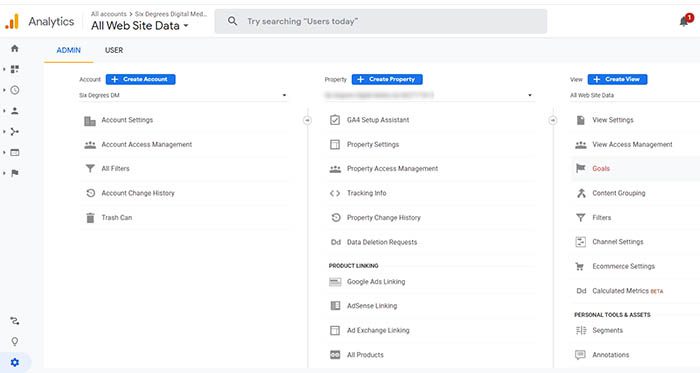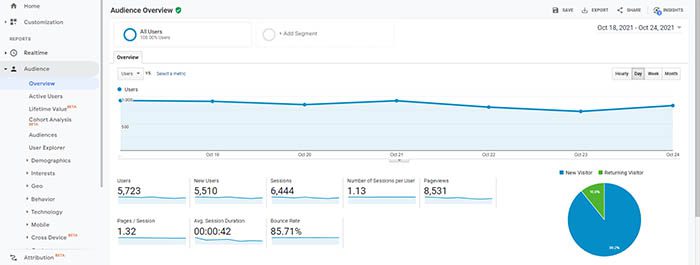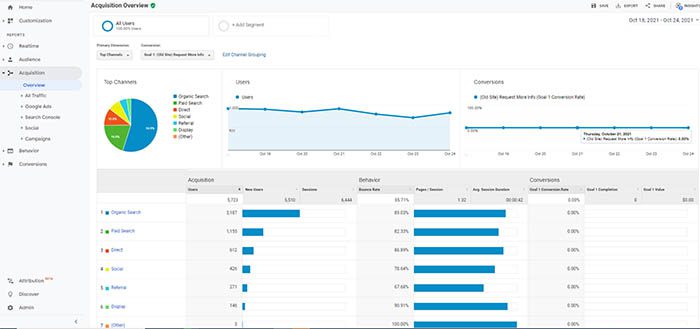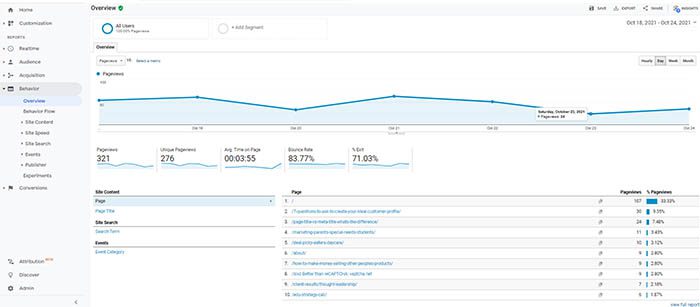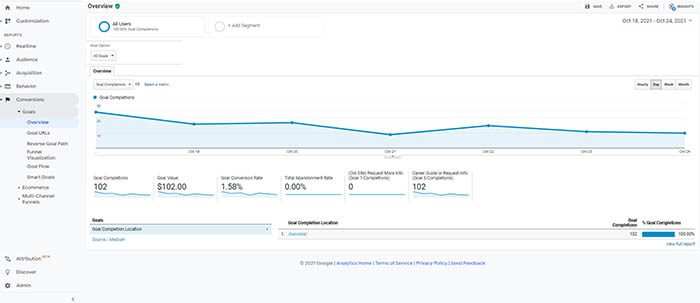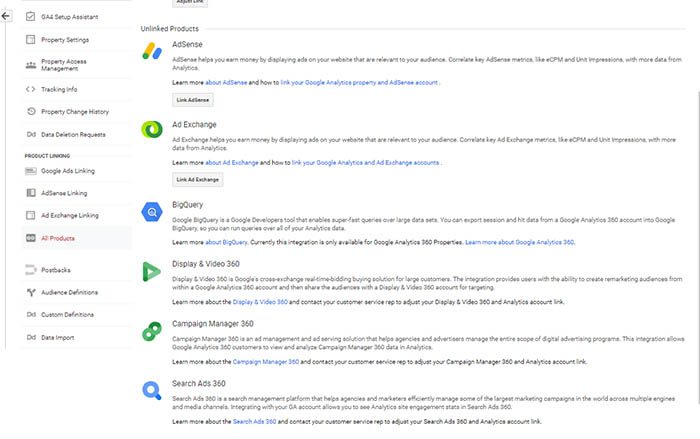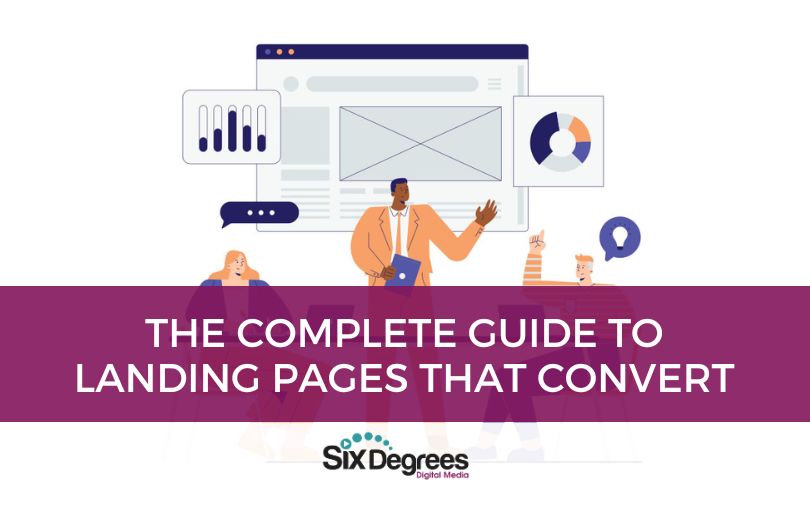If you’re looking for a means of tracking data regarding the performance and behavior of your website’s users, Google Analytics is for you.
Not only does it allow you to gain a better understanding of your audience, but it assists in decision making, forecasting, and determining what marketing strategies work and what ones don’t.
The breadth of data that Google Analytics provides is invaluable.
What follows will be a discussion of what Google Analytics is, and the several benefits that come with it! So, without further ado, let’s jump right into it.
What is Google Analytics?
Simply put, Google Analytics is a superior analytics tool used to gain valuable insight into the performance and behavior of your target audience and website at large. One of many Google tools, Google Analytics comes with the ability to connect to Google Search Console, Google Ads Manager, and Google Tags Manager, among other useful features.
And the best part is it’s totally free to use and set up! I mean, who doesn’t love free things?
Upon setting up your Google Analytics profile, you’ll be welcomed by its dashboard offering several beneficial features and functions. On the sidebar of the homepage, you’ll see each dashboard dropdown. It’s here where you’ll find all of the analytical data you need, and then some.
Below are the primary dashboard features of Google Analytics:
Audience (i.e. Audience Overview, Geo Demographics, Mobile Traffic, etc.)
Here, you’ll learn all that you need to learn about your site’s users. If you just want a bird’s eye view of this data, simply click the ‘Overview’ option. If you want to take a deeper dive into the specifics of your audience’s analytics, choose from the demographics, mobile traffic, or interests sections, among others.
Acquisition (i.e. Acquisition Overview, Traffic Analytics, Search Console, etc.)
While the audience dashboard informs you about, well, your audience, the acquisition dashboard informs you about how those users found your site. In other words, how they were acquired. Similarly, if you just want a bird’s eye view of this data, simply click the ‘overview’ tab. For a deeper dive, choose from traffic analytics, Google Search Console, or Google Ads, among others.
Behavior (i.e. Behavior Overview, Behavior Flow, Site Speed, etc.)
While you can find behavioral data via the audience and acquisition dashboard, the behavior dashboard is where you go for a deeper, more comprehensive insight into user behavior. For an overview, click ‘overview’ (shocker!) to view data regarding bounce rates, page views, and session duration. For a deeper dive, visit the behavior flow or site speed tabs. It’s here where you’ll learn more practical data that may help you with improving technical SEO!
Conversions (i.e. Conversion Goals, etc.)
The final primary dashboard on your Google Analytics homepage is Conversions. Properly named, the conversions dashboard is where you’ll gain insight into how your site users convert. In other words, what actions are they performing on your site and how much are they performing them. The primary function of the conversions tab, withstanding the insight into the data, is the ‘goals’ tab. This is an extremely effective tool not only for setting goals but for tracking the performance of said goals.
The Benefits of using Google Analytics
Besides the fact that it’s a free service, reason enough for your business to be using it, Google Analytics happens to provide several useful features that are extremely beneficial.
While the platform itself is certainly user-friendly, it will take some time to familiarize yourself with it. Once your profile is set up and you’ve become familiar with its functionality, however, you’ll come to value its services more than any other platform you’re currently using.
Below are the primary benefits of using Google Analytics for your business:
• Identify and Track Web Traffic
• Understand User Behavior
• Insight into Target Audience Data
• Data Collection & Reporting Tools
• Set Conversion Goals
• Improve SEO (note Technical SEO & Site Speed)
• It’s Free!
With Google Analytics, you can connect to all other Google Properties such as YouTube, Google Ads, and Google Search Console, among others.
Moreover, by integrating it with your social media, landing pages, and email software, Google Analytics provides you with the informative data to suggest which platforms are converting and which ones aren’t, ultimately informing you which platforms to focus on and which ones you may want to reduce your time and efforts on.
Why Your Business Needs Google Analytics
While the applications of Google Analytics are abundant, there happens to be somewhat of a trend when it comes to the primary reasons many businesses choose to take advantage of its services.
Whether you’re a digital marketing professional seeking to improve strategies, a web developer eager to optimize technical functionalities, or you’re a business owner trying to boost your website’s SEO score, Google Analytics can help.
Below are the three (3) primary reasons why your business needs to start using Google Analytics if you aren’t already doing so:
Improves Your Marketing Strategy
An effective digital marketing strategy entails several different factors when it comes to the decision-making and strategic planning of a particular campaign. Moreover, a marketing strategy without a goal is simply a theory.
With Google Analytics, you can analyze traffic data, understand user behavior, and set conversion rate goals base on past, present, and future conversion data.
By gaining a better insight into your audience and your site’s performance, you gain a better understanding of what to implement into your digital marketing strategy.
Improves Website Performance
Having an intimate understanding of your website and its performance is crucial to determining what steps are required to further its growth and success, and conversely, eliminating what might not be working.
By learning what pages are most popular, where users are converting the most, and what technical SEO aspects are functioning properly and what ones aren’t (i.e. website speed), You inevitably gain the tools to make the necessary adjustments to improve your website’s performance.
Improves Technical SEO
While there are several SEO tools and platforms available, Google Analytics is superior because of the way it acts as a one-stop shop. If you want to know how much traffic you’re driving, what landing pages are converting, and what searches are bringing users to your site, Google Analytics can help.
The more you understand your website’s success and pitfalls, the faster you can make the adjustments to improve it. With the abundant amount of data provided via Google Analytics, you can improve your site’s SEO score and ultimately increase your conversion rate and in turn, your ROI.
Contact Six Degrees Media
If you want to learn more about how to track and report data, improve SEO, and increase ROI from your website, Six Degrees Digital Media can help. Contact us today to book a complimentary strategy session.


